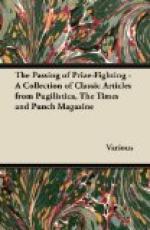Hist! What is that? Thought
I heard a low grunt.
Hope not, I’m sure,
for I’m sick of stye-voices
ARTHUR of those, has no doubt, borne the
brunt;
Now in a semi-relief he rejoices
Pigs are fit only for styes and nose-ringing.
Never let Irish ones run loose
and root,
Rather wish ARTHUR were less sweet on
flinging
Pearls before pigs; as well
feed ’em on fruit.
Hrumph! There. I thought
so! Hrumph! hrumph! What a pest!
Sure that big brute has his
eye on my ladder.
Has ARTHUR loosed him? He thinks
he knows best,
But a nasty spill now!—nothing
well could be sadder
Brutes always rub their broad backs and
stiff bristles
Against—anything
that comes handy. Oh lor!
How the brute shoulders, and snorts, grunts
and whistles!
Off to the gutter, you big
Irish boar!
Not he! He nears me! It
is ARTHUR’s pet.
Light ladder this; would capsize in a jiffy.
His bristles he’d scrape and his tusks he
would whet
Against it, I wish he were drowned in the Liffey!
Whisht! Get away! He’s so
heavy and big.
There! round the ladder he’s playing the
fooler.
Ah! there’s the rub. PATRICK scumfish
that Pig!
If he doesn’t mean deviltry I’m a—Home
Ruler!
[Left fidgetting.
* * * * *
UNASKED.
Unasked, the Tax-Collector wild
Presents to smirking MARY his
Demand—on what the Roman styled
“Kalendis Januariis.”
Unasked, a Christmas-box to gain,
Sweeps, lamplighters, and
postmen come;
Unasked—too often to remain—
The wife’s mammas of
most men come.
Unasked, it looms—that ophicleide
From Germany, with melodies
Whereat the cow of story died;
Whereat a modern fellow dies.
Unasked, partakes my Christmas cheer,
(Whom oft, my front-door bell
at, I’ve
Surprised, the better much for beer)—
My Cook’s fraternal
relative.
Unasked, my bills appear in shoals,
“With compliments”
from creditors;
Unasked, in verse I send my soul’s
Throbs—with a stamp—to
Editors.
Unasked, that editorial pack
Return my “throbs”
in heavy, new,
Crisp envelopes, unstamped, alack!
While I defray the Revenue.
* * * * *
MRS. RAM’s nephew was reading aloud the prospectus of the Clerical, Medical, and General Life Assurance Society. She was much impressed by the idea of Clerical Assurance, and expressed herself greatly pleased at the Ven. Archdeacon FARRAR being one of the Directors. “But what puzzles me,” observed the excellent lady, “is a paragraph headed ‘Disposal of the Surplice.’ I know that, years ago, there was a ‘surplice difficulty.’ But I thought that had been disposed of. Or,” she added, brightening up, as if struck by a happy solution of the difficulty, “does it mean that the Clerical Assurance Society means to take in washing? Most useful if they do, and so paying.”




